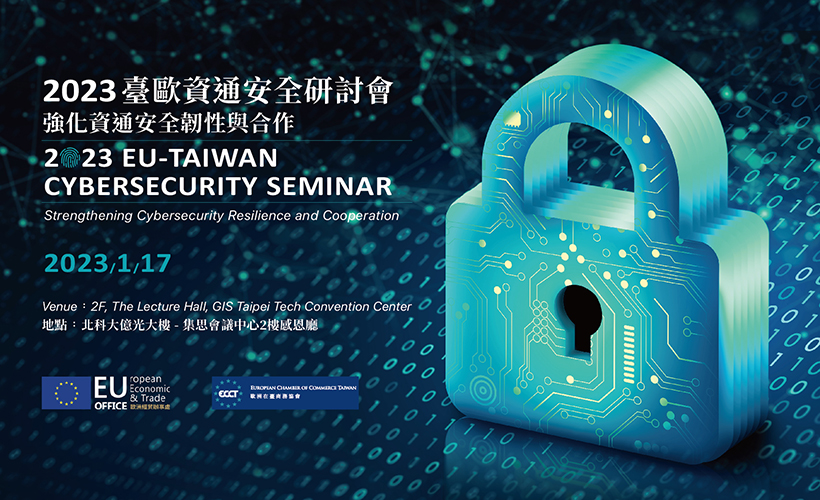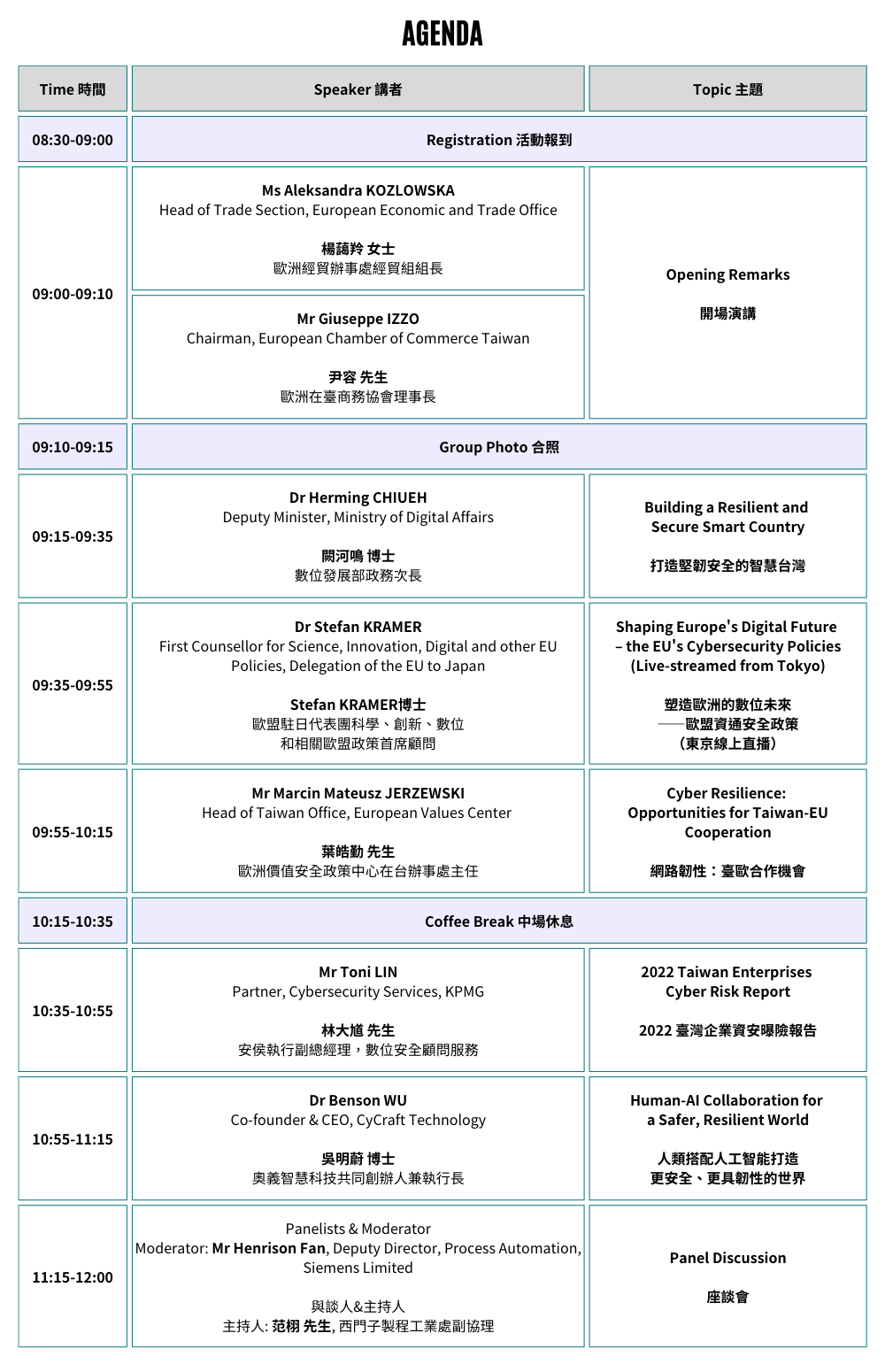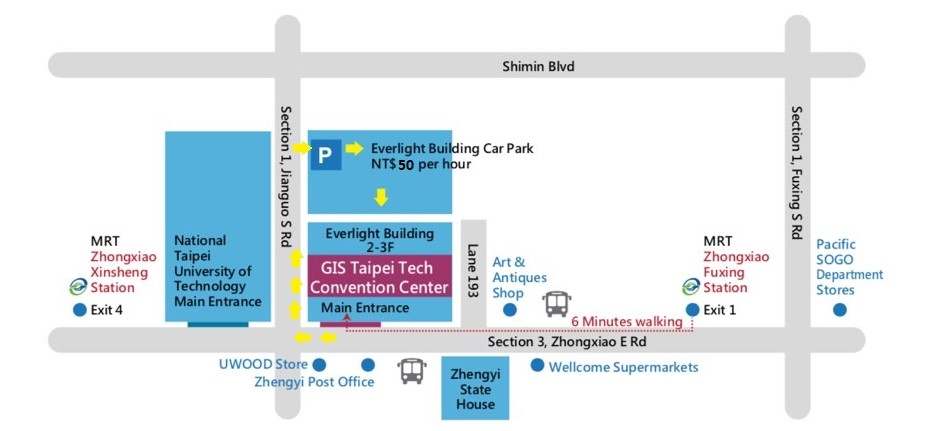17
Jan
2023 EU-Taiwan Cybersecurity Seminar
- 本活動已經結束。

ECCT-EU Event
Strengthening cybersecurity resilience and cooperation
Guests of honour
- Ms Aleksandra KOZLOWSKA (楊藹羚), Head of Trade Section, European Economic and Trade Office
- Mr Giuseppe IZZO (尹容), Chairman, European Chamber of Commerce Taiwan
Guest speakers
- Dr Herming CHIUEH (闕河鳴), Deputy Minister, Ministry of Digital Affairs
- Dr Stefan KRAMER, First Counsellor for Science, Innovation, Digital and other EU Policies Delegation of the EU to Japan
- Mr Marcin Mateusz JERZEWSKI (葉皓勤), Head of Taiwan Office, European Values Center
- Mr Toni LIN (林大馗), Partner, Cybersecurity Services, KPMG
- Dr Benson WU (吳明蔚), Co-founder & CEO, CyCraft Technology
Moderator
- Mr Henrison FAN (范栩), Deputy Director, Process Automation, Siemens Limited
Date: Tuesday, 17 January 2023
Time: 08:30-12:00
Venue: 2F, The Lecture Hall, GIS Taipei Tech Convention Center / 北科大億光大樓-集思會議中心2樓感恩廳
Address: No. 1 (Next to No. 197), Sec. 3, Zhongxiao E. Rd., Da’an Dist., Taipei City / 台北市大安區忠孝東路三段1號 (197號旁邊棟)(會議中心不是在北科大校園内,請特別留意)
Cybersecurity is a key concern of both governments and corporations, especially in the digital era. This event will bring together policy makers and cybersecurity experts from the EU and Taiwan to discuss recent and ongoing trends, opportunities and challenges in cybersecurity and share best practices in terms of government policy and how to increase resilience against a variety of cyber threats facing businesses.
In November 2022 the European Commission issued a Joint Communication on an EU Cyber Defence policy and an Action Plan on Military Mobility 2.0 to address the deteriorating security environment following Russia's aggression against Ukraine and to boost the EU's capacity to protect its citizens and infrastructure. The policy aims to enhance cooperation and investments in cyber defence to better protect, detect, deter, and defend against a growing number of cyber-attacks. In addition, the EU’s proposed Cyber Resilience Act aims to bolster cybersecurity rules to ensure more secure hardware and software products.
Taiwan faces constant cyberattacks intended to destroy or steal data from its political and military institutions and corporations and spread disinformation, while analysts have warned about potential cyberattacks against Taiwan’s key infrastructure, including its power grid, water supply as well as Taiwan’s satellites. Cybersecurity is one of the main concerns of Taiwan’s recently-launched Ministry for Digital Affairs (MODA), which has an Administration for Cyber Security and a dedicated Department of Communications and Cyber Resilience. This year, MODA plans to set up a National Institute of Cyber Security, which will have a staff of about 180 initially and board members from several from government agencies, including the National Security Council and the Ministry of National Defence as well as cybersecurity scholars and professionals. Taiwan has also passed legislation aimed at addressing corporate espionage.
In the business world, the global coronavirus pandemic, which expedited the trends of remote work and digitalisation, have increased the associated digital footprints of organisations with more digital processes being conducted in the cloud, and thereby exposing organisations to cybersecurity threats. Some of the top threats facing small and medium businesses are ransomware, misconfigurations and unpatched systems due to outdated hardware and software, credential stuffing (when an attacker uses stolen credentials from one organisation to access user accounts at another organisation), and social engineering (system breaches which cause the unknowing release of confidential information, commonly done via phishing attacks and attacks on the digital supply chain). Ransomware used to focus solely on encrypting data but has now evolved to incorporate data theft, distributed denial of service (DDoS), and other threats. Phishing emails have become a common method of attack. Meanwhile the internet of things, whereby an increasing number of hardware devices are connected to the internet make them vulnerable to hackers to access and abuse. Our guest speakers will talk about some of the most common cybersecurity threats facing governments and corporations and some of the most effective remedies to address them.





